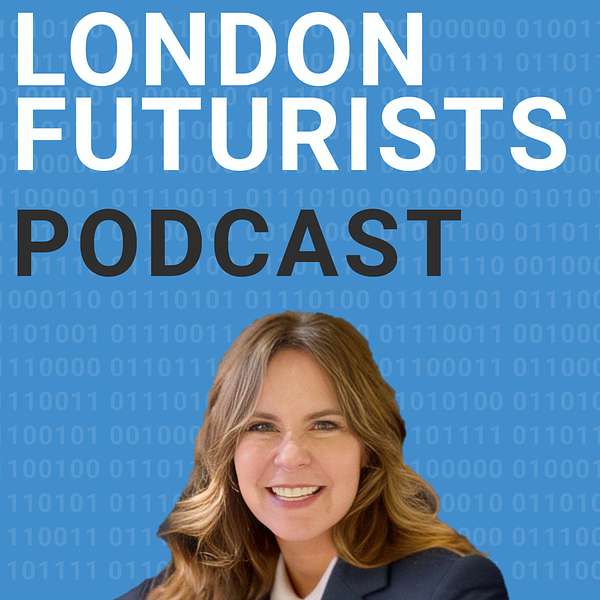
London Futurists
Anticipating and managing exponential impact - hosts David Wood and Calum Chace
Calum Chace is a sought-after keynote speaker and best-selling writer on artificial intelligence. He focuses on the medium- and long-term impact of AI on all of us, our societies and our economies. He advises companies and governments on AI policy.
His non-fiction books on AI are Surviving AI, about superintelligence, and The Economic Singularity, about the future of jobs. Both are now in their third editions.
He also wrote Pandora's Brain and Pandora’s Oracle, a pair of techno-thrillers about the first superintelligence. He is a regular contributor to magazines, newspapers, and radio.
In the last decade, Calum has given over 150 talks in 20 countries on six continents. Videos of his talks, and lots of other materials are available at https://calumchace.com/.
He is co-founder of a think tank focused on the future of jobs, called the Economic Singularity Foundation. The Foundation has published Stories from 2045, a collection of short stories written by its members.
Before becoming a full-time writer and speaker, Calum had a 30-year career in journalism and in business, as a marketer, a strategy consultant and a CEO. He studied philosophy, politics, and economics at Oxford University, which confirmed his suspicion that science fiction is actually philosophy in fancy dress.
David Wood is Chair of London Futurists, and is the author or lead editor of twelve books about the future, including The Singularity Principles, Vital Foresight, The Abolition of Aging, Smartphones and Beyond, and Sustainable Superabundance.
He is also principal of the independent futurist consultancy and publisher Delta Wisdom, executive director of the Longevity Escape Velocity (LEV) Foundation, Foresight Advisor at SingularityNET, and a board director at the IEET (Institute for Ethics and Emerging Technologies). He regularly gives keynote talks around the world on how to prepare for radical disruption. See https://deltawisdom.com/.
As a pioneer of the mobile computing and smartphone industry, he co-founded Symbian in 1998. By 2012, software written by his teams had been included as the operating system on 500 million smartphones.
From 2010 to 2013, he was Technology Planning Lead (CTO) of Accenture Mobility, where he also co-led Accenture’s Mobility Health business initiative.
Has an MA in Mathematics from Cambridge, where he also undertook doctoral research in the Philosophy of Science, and a DSc from the University of Westminster.
London Futurists
Generative AI, cybercrime, and scamability, with Stacey Edmonds
One of the short-term concerns raised by artificial intelligence is cybercrime. Cybercrime didn’t start with AI, of course, but it is already being aggravated by AI, and will become more so.
We are delighted to have as our guest in this episode somebody who knows more about this than most people. After senior roles in audit and consulting firm Deloitte, and the headhunting firm Korn Ferry, Stacey Edmonds set up Lively, which helps client companies to foster the culture they want, and to inculcate the skills, attitudes, and behaviours that will enable them to succeed, and to be safe online.
Stacey’s experience and expertise also encompasses social science, youth work, education, Edtech, and the creative realm of video production. She is a juror at the New York Film Festival and the International Business Awards.
In this discussion, Stacey explains how cybercrime is on the increase, fuelled not least by Generative AI. She discusses how people can reduce their 'scam-ability' and live safely in the digital world, and how organisations can foster and maintain trusted digital relationships with their customers.
Selected follow-ups:
https://www.linkedin.com/in/staceyedmonds/
https://futurecrimesbook.com/ (book by Marc Goodman)
https://cybersecurityventures.com/cybercrime-to-cost-the-world-8-trillion-annually-in-2023/
https://www.vox.com/technology/2023/9/15/23875113/mgm-hack-casino-vishing-cybersecurity-ransomware
https://www.trustcafe.io/
Topics addressed in this episode include:
*) Excitement and apprehension following the recent releases of generative AI platforms
*) The cyberattack on the MGM casino chain
*) Estimates of the amount of money stolen by cybercrime
*) The human trauma of victims of cybercrime
*) Four factors pushing cybercrime figures higher
*) Hacking "the human algorithm"
*) Phishing attacks with and without spelling mistakes
*) The ease of cloning voices
*) The digital wild west, where the sheriff has gone on holiday
*) People who are particularly vulnerable to digital scams
*) The human trafficking of men with IT skills
*) Economic drivers for both cybercrime and solutions to cybercrime
*) Comparing the threat from spam and the threat from deep fakes
*) Anticipating a surge of deep fakes during the 2024 election cycle
*) A possible resurgence of mainstream media
*) Positive examples: BBC Verify, Trust Café (by Jimmy Wales), the Reddit model of upvoting and downvoting, community notes on Twitter
*) Strengthening "netizen" skills in critical thinking
*) The forthcoming app (due to launch in November) "Dodgy or Not" - designed to help people build their "scam ability"
*) Cyber meets Tinder meets Duolingo meets Angry Birds
*) Scenarios for cybercrime 3-5 years in the future
*) Will a future UGI (Universal Generous Income) reduce the prevalence of cybercrime?
Music: Spike Protein, by Koi Discovery, available under CC0 1.0 Public Domain Declaration
Elevate how you lead with insight from today’s most influential executives.
Listen on: Apple Podcasts Spotify

